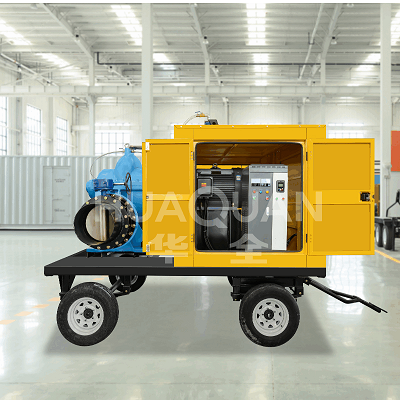An emergency pump is a robust, often portable, device designed to manage fluid disasters when standard systems fail. Unlike everyday pumps, they prioritize reliability, rapid deployment, and durability under extreme conditions. Whether combating floods, industrial leaks, or system breakdowns, these pumps are lifelines for industries, homeowners, and municipalities alike.

Types of Emergency Pumps & Their Roles
- Submersible Emergency Pumps
- Ideal for: Flooded basements, construction sites, or emergency septic pumping.
- Features: Waterproof designs, automatic activation, and the ability to handle solids-laden water.
- Trash Pumps
- Use Case: Post-storm cleanup or industrial spills.
- Strength: Can pass debris up to 3 inches in diameter.
- High-Pressure Pumps
- Critical for: Firefighting or heat pump emergencies where sudden pressure surges are needed.
- Battery-Powered Pumps
- Best for: Remote areas or minor residential floods.
Emergency Septic Pumping: A Critical Application
Sewage backups or overloaded septic systems demand immediate action to prevent health hazards and property damage. Here, emergency septic pumping services rely on heavy-duty submersible pumps to:
- Quickly drain tanks to avoid overflow.
- Operate in contaminated environments without failure.
- Integrate with vacuum trucks for large-scale cleanup.
Pro Tip: Homeowners in flood-prone areas should pre-identify local septic emergency services to avoid delays.

Heat Pump Emergencies: When Pumps Save the Day
Heat pumps—used for heating and cooling—can malfunction in extreme temperatures. During a heat pump emergency, auxiliary pumps may be deployed to:
- Circulate refrigerant or glycol to prevent system freeze-ups.
- Drain condensation buildup that could cause electrical shorts.
- Support commercial HVAC systems during peak demand.
Fun Fact: Some modern heat pumps include built-in emergency pumps for automated self-preservation!

Key Features to Prioritize
When selecting an emergency pump, focus on:
- Power Source: Diesel (for longevity) or hydraulic (for explosion-proof zones).
- Portability: Wheel kits or compact designs for fast positioning.
- Flow Rate: Measure in GPM (gallons per minute) to match your crisis needs.
- Material: Stainless steel or thermoplastic for corrosion resistance.
Maintenance Checklist
- Monthly: Start the pump to ensure it activates under load.
- After Use: Flush debris from intakes and check hoses for cracks.
- Annually: Replace fuel (for diesel models) and test battery backups.
Industries That Rely on Emergency Pumps
- Construction: Dewatering excavations.
- Agriculture: Draining flooded fields.
- Municipalities: Managing sewer overflows.
- Oil & Gas: Containing hazardous spills.
FAQs
Q: Can an emergency pump handle sewage?
A: Yes—submersible models with non-clog impellers are designed for emergency septic pumping.
Q: How quickly can a pump drain a flooded basement?
A: A 1/3 HP pump can remove 1,800 gallons per hour, clearing a 12×12-foot basement in under 2 hours.
Q: Are there eco-friendly options?
A: Solar-powered pumps reduce emissions for sensitive environments.
Conclusion
An emergency pump is more than a tool—it’s a strategic investment in resilience. Whether you’re a homeowner facing septic backups or an engineer managing heat pump emergencies, the right pump can avert disasters. Prioritize reliability, maintain it rigorously, and stay prepared for the unexpected.
More information: http://www.huaquandongli.com/



